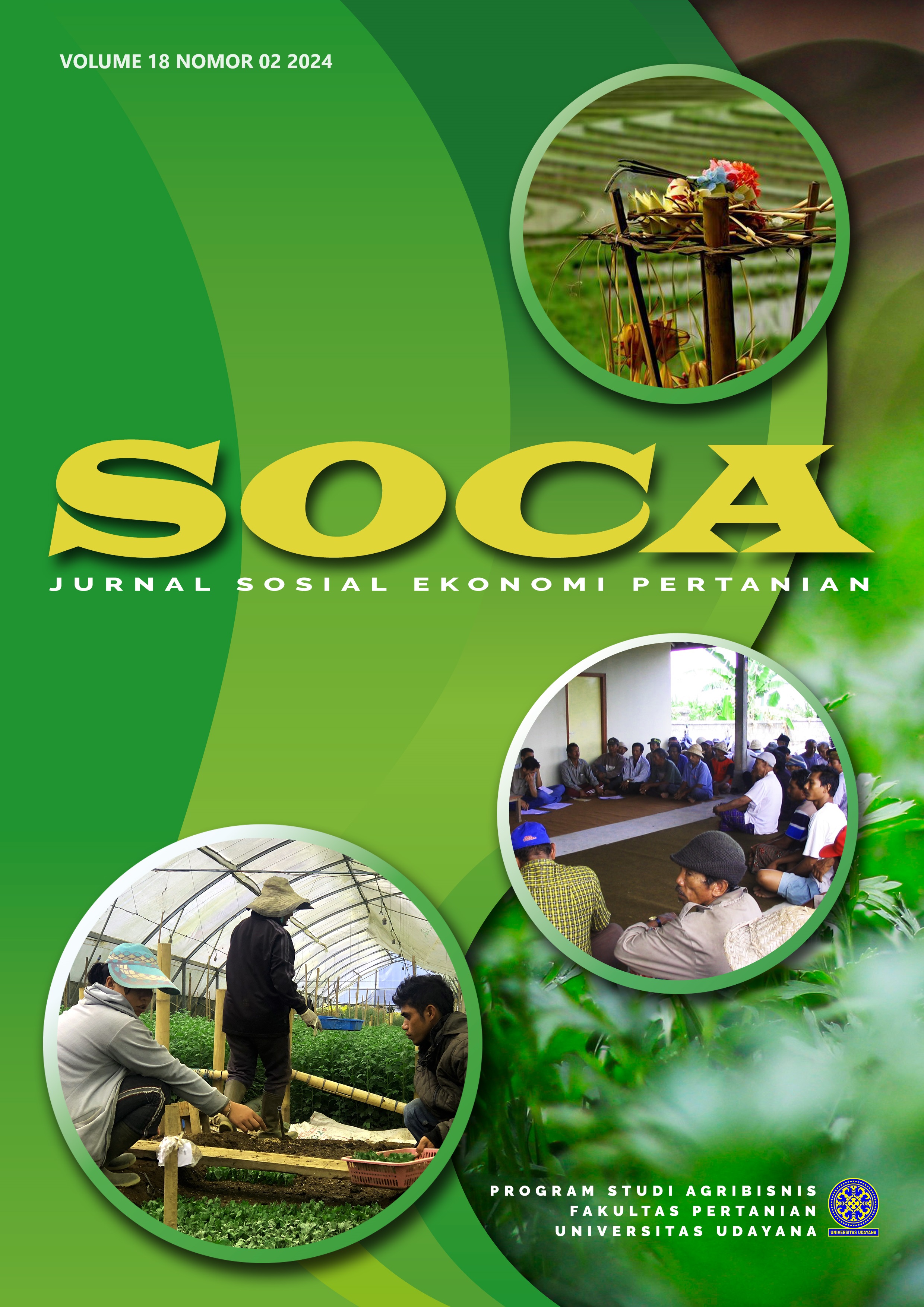Woman and Rural Development: An Exploration of Balinese Women’s Involvement in Rural Homestay
Abstract
Homestays have emerged as a crucial discussions issue in village development initiatives. The subject of women’s involvement in household business has enhanced the discussion of how their participation improves individual quality in social interactions and is equally vital in village development. This study investigates the role of homestays in empowering women in rural Balinese communities, specifically Ubud and Blimbingsari. Despite a patriarchal social structure, women are increasingly involved in homestay businesses. The research employs a qualitative approach, using primary data sources; collected through interviews with purposive sampling. This research found that homestay businesses play a pivotal role in empowering and encouraging female members of the Ubud and Blimbingsari communities, fostering their self-recognition within their families and society. Through regular management and training, these businesses have significantly advanced the skills of female hosts, particularly in areas such as room preparation, cooking, communication, and hospitality. While these efforts have been beneficial, there remains room for further empowerment beyond the current limitations, especially in decentralizing control within the Blimbingsari tourism committee
Downloads
References
Acharya, S. (2018). Nepali journal of contemporary studies. Nepal Journal of Contemporary Studies, 8(1-2 January-December), 25–48.
Bogdan, B., & Bilken, S. K. (1992). Quality research for education: An introduction to theory and methods. Qualitative Research For Education An Introduction to Theory and Methods : : Allyn and Bacon., 106–156.
Cukier, J., Norris, J., & Wall, G. (1996). The involvement of women in the tourism industry of Bali, Indonesia. Journal of Development Studies, 33(2), 248–270. https://doi.org/10.1080/00220389608422465
Cukier, J., Norris, J., & Wall, G. (1996). The involvement of women in the tourism industry of Bali, Indonesia. Journal of Development Studies, 33(2), 248–270. https://doi.org/10.1080/00220389608422465
Darmayoga, I., K., A. (2021). Perempuan Dan Budaya Patriarki Dalam Tradisi, Keagamaan Di Bali. Danapati, 1(2), 139–152.
Hartaka, I. M., & Suadnyana, I. B. P. E. (2018). Dharma Agama Dan Dharma Negara di Era Kekinian. Pariksa: Jurnal Hukum Agama Hindu, 2(1), 81–94.
IFAD, I. F. F. A. D. (2011). Women and Rural Development.
Intan, O., Noor Hazlina, A., Zainal Ariffin, A., Azrina, H., Saridan, A. B., & Nur Diyana, T. (2014). Understanding Motivation, Empowerment and Sustainability Outcomes of Women Homestay Entrepreneurs in West Malaysia. A Preliminary Analysis. International Journal of Gender and Entrepreneurship, 1–27.
Kabeer, N. (1999). The Conditions and Consequences of Choice: Reflections on the Measurement of Women’s. UNRISD Discussion Paper, 30(108), 435–464. http://doi.wiley.com/10.1111/1467-7660.00125
Lynch, P. A. (2005). The commercial home enterprise and host: A United Kingdom perspective. International Journal of Hospitality Management, 24(4), 533–553. https://doi.org/10.1016/j.ijhm.2004.11.001
Moleong, L. (2002). Metode Penelitian Kualitatif. CV. Remaja.
Moser, C. O. N. (1989). Gender planning in the third world: Meeting practical and strategic gender needs. World Development, 17(11), 1799–1825. https://doi.org/10.1016/0305-750X(89)90201-5
Segara, I. N. Y. (2019). Balinese Hindu Women. 339(Aicosh), 170–174. https://doi.org/10.2991/aicosh-19.2019.38
Shantika, B., Ernawati, N. M., & Sarja, N. L. A. K. Y. (2021). Balinese Women’s Role and Gender Gap in the Sustainable Tourism Development. International Journal of Green Tourism Research and Applications, 3(2), 49–57.
Suyadnya, I. W. (2009). Balinese women and identities: Are they trapped in traditions, globalization or both? Masyarakat, Kebudayaan Dan Politik, XXII(2), 95–104.
Tajeddini, K., Ratten, V., & Denisa, M. (2017). Female tourism entrepreneurs in Bali, Indonesia. Journal of Hospitality and Tourism Management, 31(March 2018), 52–58. https://doi.org/10.1016/j.jhtm.2016.10.004
Walle, A. H. (1997). Quantitative versus qualitative tourism research. Annals of Tourism Research, 24(3), 524–536.
Wayan, K. Y. I., & Nyoman, S. (2020). Political Phenomenon of Women in Culture Patriarchy in Gianyar, Bali. Budapest International Research and Critics Institute (BIRCI-Journal): Humanities and Social Sciences, 3(3), 2158–2164. https://doi.org/10.33258/birci.v3i3.1148













